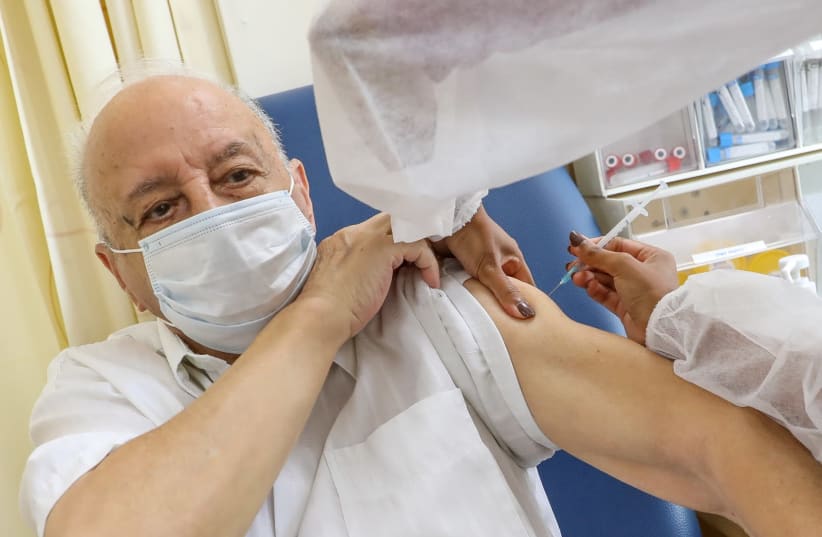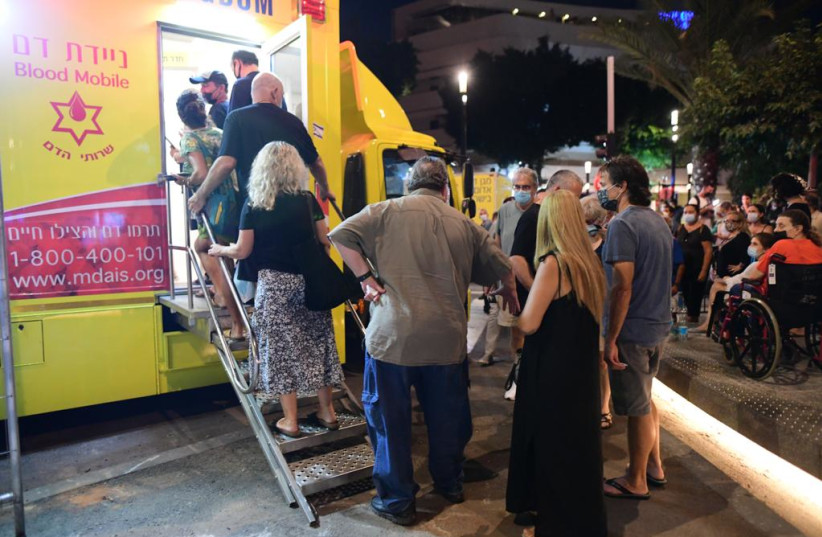Israel registered over 500 serious patients on Sunday, the highest number since March. Health Ministry Director-General Prof. Nachman Ash said however that the number is expected to drop thanks to the effect of the booster campaign.
“In the coming week we hope to see signs of a decrease in serious morbidity among people over 60 who are seriously ill,” Ash said, speaking to FM 103 Radio. “We have preliminary information on the effect of the third vaccine against infection. We estimate that this has halved the number of cases among the vaccinated, and in the coming days we will have to see that this trend is maintained and this is also reflected in the serious morbidity.”
Israel started to vaccinate individuals over 60 with a third shot on July 30, and over 925,000 people have received it, out of a total population of some 1.6 million. On Friday, the age was lowered to 50.
A decision was made to start a new vaccination campaign after it became clear that the highly contagious Delta variant was in many cases breaking through the protection offered by the inoculation, specifically among the elderly who were jabbed at the beginning of the year. Unvaccinated individuals still remain significantly more likely to develop serious symptoms.
As of Sunday, Israel had 525 patients in serious condition, 162 more than a week earlier. Of those, 404 are over 60, with 277 of them fully vaccinated. Considering the serious cases per 100,000 people over 60, there are 21 cases among the vaccinated – who are over 90% of the cohort – while among the unvaccinated it is 135.
At the peak of the pandemic in January, the country reached 1,200, severely straining the health system.
“Seventy-eight of the 79 Israelis who died last week, *did not* take all three required vaccinations,” Prime Minister Naftali Bennett said on Twitter. “In other words, the third vaccine is not a ‘luxury’ —it really saves lives.”
Earlier in the day, Bennett visited Sourasky Medical Center (Ichilov Hospital), Tel Aviv. “Tomorrow we intend to pass the threshold of one million people inoculated with a third vaccine,” he said. “Israeli citizens are the only ones in the world who can be vaccinated for the third time.”
The prime minister urged anyone over 50 to get inoculated. “Go to the vaccination centers, even without an appointment, at all the health funds, and they will accept you,” he said. “We can defeat the corona pandemic with two main tools: the masks – they work – and the vaccines. Whoever gets vaccinated saves another business, whoever gets vaccinated prevents another child from sitting for a year in front of Zoom, whoever gets vaccinated protects the health of us all and the economic future of us all.”
There were 4,145 new virus carriers identified on Saturday, with 5.4% of the people screened testing positive, the highest rate since the beginning of March.
Government and health officials hope that the new vaccination campaign will help decrease morbidity to avoid harsher restrictions.
“I think we should wait and see the effect of the third vaccine, I very much hope that it will reduce the serious illness and that it will prevent a lockdown,” Ash said. “If there is no reduction in the serious illness, we will have to take the difficult steps and go to a lockdown.
“The strategy we have chosen is to try to avoid shutting down the economy because of the economic and non-economic costs, based on the fact that the vaccines will have an effect, and that the various decisions such as green pass and the Purple Ribbon will reduce morbidity,” he said. “We do not know if it works, and if it does not work we will probably have to go for tougher restrictions as well.”
Beginning on Wednesday, the green pass system will be expanded to all activities and venues except for malls and stores, for which the Purple Ribbon outline will be brought back, allowing a maximum of one person per seven square meters (stores less than 100 sq.m. will be exempt).
Under the green pass system, only individuals who are vaccinated, have recovered, or have undergone a rapid test in the previous 24 hours will be entitled to enter certain venues.
In addition, the Health Ministry announced on Thursday that event halls can only welcome 400 people indoors and 500 people outdoors. Such a cap had not been announced before. Moreover, an individual PCR test will be enough to access a hotel for the entire duration of a vacation. For children under 12 the PCR test will be offered for free.
Earlier in the day, the MKs who sit in the corona cabinet were notified that one of the participants in the last meeting on Wednesday tested positive for the virus. It was soon revealed that the person in question was Defense Minister Benny Gantz’s military secretary, Brigadier-General Yaakov Dolph. Gantz’s office said that Dolph had entered isolation, and anyone who came into contact with him would undergo a COVID test. The minister tested negative.

